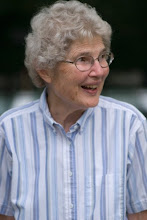I ran across an interesting article last week about a 101-year old woman named Eulalia Garcia Maturey, who was born in Mexico but was carried as an infant by her mother to Texas back in 1909. For most of her life, Eulalia didn't worry about immigration status: she lived one place and had family not too far away--who cares if there's a border in between?
The government, it turns out, cared in 1940, when wartime fears about foreigners prompted a law that required all resident aliens to register, and then again in 2008, when federal agents started requiring documentation for everyone crossing the border either way. Eulalia had registered in 1941 and received a certificate of legal entry but was worried it wouldn't count in 2008. She was nervous about asking questions, though, lest she get deported to a country she'd visited many times, but never called home--age 101 is a little late in life to want to be forced to move. When her niece finally persuaded her to go to a U.S. Citizenship and Immigration Office, it turned out that Eulalia's carefully-preserved 69-year-old certificate qualified her for citizenship. Had the card been lost or damaged beyond legibility, she might not have had a case.
It is a (probably inevitable) irony that a 69-year old card means more in such contexts than 101 years of life, of washing laundry and bearing children and falling asleep under the Texas skies.
It reminds me of a story in our family: sometime in the late 1970s, my great-grandma Basant Kaur Gill (who we called Beiji), wanted to visit her grandchildren in America. Her husband, Ram Singh, had gone without any trouble the previous year, but Beiji had a problem: her name wasn't on any of her children's birth certificates, and so she couldn't document a connection to relatives in the United States. If she could produce a marriage certificate connecting her to her husband, officials suggested, then his name on the birth certificates would also count for her. But Beiji didn't have a marriage certificate--what's the need for a certificate when your husband, who served several terms as sarpanch (village mayor) never saw a need to learn how to read?
The need for a certificate is this: Eulalia and Beiji grew up in worlds which were primarily local, where things like physical distance and acquaintance mattered deeply, where local custom meant more than imposed outside procedure. They grew old, though, in times when increasing travel and trade tipped the balance against the local. Coal, oil, and the technologies they gave birth to made physical distance matter less, in turn making imaginary distances (like the one across the man-made border between the U.S and Mexico) matter more. International travel made actual, locally-observable reality (a big wedding, years living together, the birth of ten children) matter less than more transportable images of reality captured on forms.
It may be that someday fuel shortages or other ecological pressures will tip the balance again toward the local and against the government form (if they do, the transition will likely prove even difficult than the one my great-grandmother went through). Unless or until that happens, though, we're probably stuck with the ironies of paper: that what is written so often matters more than what actually is.
What do you do about that? It's probably not worth staging a protest over or getting up in arms about. No, I think the best approach is the one Beiji took: you laugh.
You laugh when, after nearly fifty years of marriage, you have to marry your husband again to get a paper, even though everyone in town still remembers your wedding party (or else the stories their parents told about your wedding party). You laugh at the fact that risking your life in painful labor is no longer good enough to make your son legally your son. You laugh that the world has gone crazy, because let's face it: particular absurdities come and go with the times, but the world has always been and probably always will be crazy.
I like to think there's a special virtue in that kind of laughter. Because if we could all learn to laugh like my grandmother at the procedures modern life makes necessary, maybe we'd live with a little more patience, a little more perspective, a little more grace, a little more mercy.
Reading at Writ & Vision Thursday
-
I'm going to be doing a reading at Writ & Vision in downtown Provo at 7 pm
this Thursday.
I'm excited: I love to read my work, but I don't actually do so v...
6 years ago

No comments:
Post a Comment